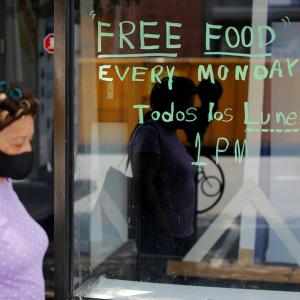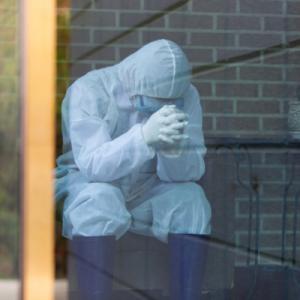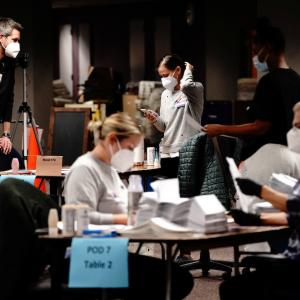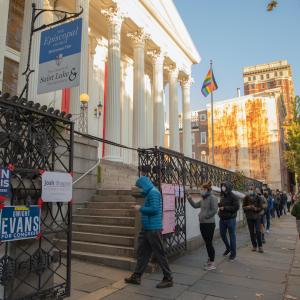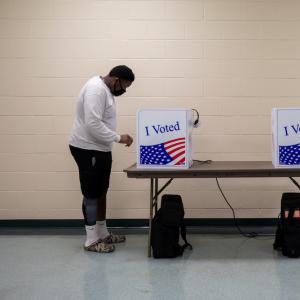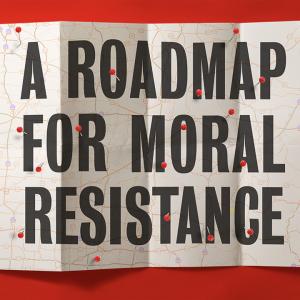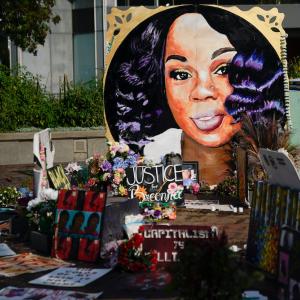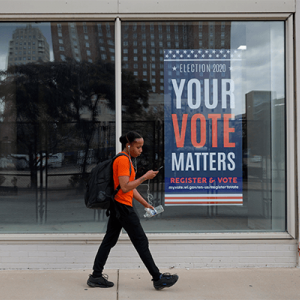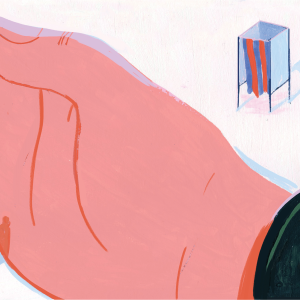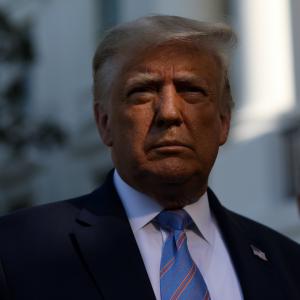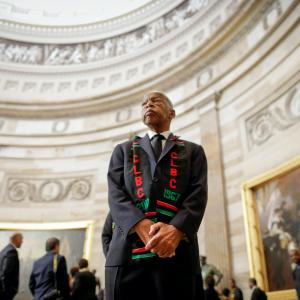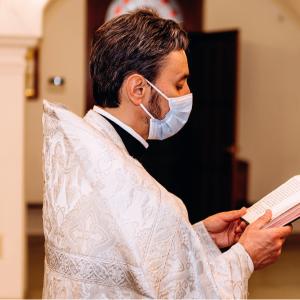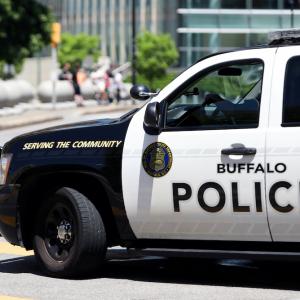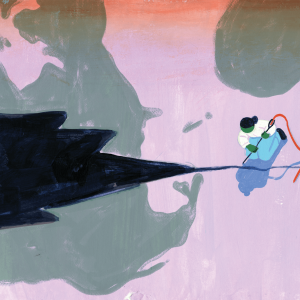
Rev. Adam Russell Taylor is president of Sojourners and author of A More Perfect Union: A New Vision for Building the Beloved Community. Follow him on Bluesky @revadamtaylor.
Taylor previously led the Faith Initiative at the World Bank Group and served as the vice president in charge of Advocacy at World Vision U.S. and the senior political director at Sojourners. He has also served as the executive director of Global Justice, an organization that educates and mobilizes students around global human rights and economic justice. He was selected for the 2009/2010 class of White House Fellows and served in the White House Office of Cabinet Affairs and Public Engagement. Taylor is a graduate of Emory University, the Harvard University Kennedy School of Government, and the Samuel DeWitt Proctor School of Theology. Taylor also serves on the Independent Sector Board, the Global Advisory Board of Tearfund UK, and is a member of the inaugural class of the Aspen Institute Civil Society Fellowship. Taylor is ordained in the American Baptist Church and the Progressive National Baptist Convention and serves in ministry at the Alfred Street Baptist Church in Alexandria, Va.
Speaking Topics
- Human rights and global poverty
- Racial justice
- Voting rights
- Climate justice
- Economic justice
- Immigration
- Peace and nonviolence
- His most recent book, A More Perfect Union: A New Vision for Building the Beloved Community
Speaking Format
- Virtual and in-person events, also available for preaching
Languages
- Fluent in English
Past Notable Events
- Tufts University’s Russell Lecture
- United Church of Christ General Synod Gathering Keynote
- Children’s Defense Fund Staff Retreat Keynote
- Parliament of the World Religions
- Christian Community Development Association Keynote Panel
Posts By This Author
How To Save 100,000 Lives
The U.S. set two disturbing records on Wednesday with more than 200,000 new coronavirus infections reported nationwide and 100,000 patients hospitalized in just one day. This brings the nation’s total to 14 million coronavirus cases and 272,000 fatalities since February. Robert Redfield, the director of the Centers for Disease Control and Prevention, said yesterday that the next three months are “going to be the most difficult time in the public health history of this nation.”
The Next Part of the Race
Adam Russell Taylor succeeds Jim Wallis as Sojourners enters 50th year
For Adam, for coming home to Sojourners, for giving us the right person at the right time for this great transition, I am grateful. And I look forward to the road ahead for all of us.
For This Vulnerable Nation, Lord, Hear Our Prayer
Yesterday our nation saw 144,000 new COVID-19 cases, a staggering and heart- wrenching number, particularly as our nation tries to turn a corner after such a bruising election. While we both felt an overwhelming sense of relief and hope when news broke Saturday that Joe Biden and Kamala Harris were declared winners of the election, events of the past few days show that this continues to be a season for fervent prayer, vigilance, and, if necessary, faithful action.
Can We Find Emmanuel During a Pandemic?
Silver linings worth fighting for.
In Paul’s letter to the church at Rome, he writes, “And we know that in all things God works for the good of those who love him” (Romans 8:28). This passage can easily be misconstrued to mean that adversity and hardship are ordained by God. A more faithful interpretation is that God can generate good out of even terrible circumstances. In light of this eternal truth, throughout this troubling year I have found hope and resilience by discovering silver linings in the midst of uncertainty and anguish.
One of the most important blessings has been extra, uninterrupted time with my family. A frenetic travel schedule in the spring came to a screeching halt in March, and I haven’t been on a plane since. My daily two-hour commute to my kids’ school and to work also vanished. I have tried to pour much of this precious gift into my family, particularly as my two young sons adjusted to the new COVID reality, including virtual classes that tested all our sanity. Our family spent the early months of the pandemic playing many games together and watching every Marvel movie made and our favorite kid-appropriate sports movies, from Remember the Titans to Miracle to 42.
Reading Isaiah as the Nation Waits
It was a fitful night of what I can only generously describe as sleep. Maybe you can relate. I drifted off to sleep early, only to be awakened at midnight by my wife, who had received the latest election alert on her phone. My 7- and 9-year-old sons were also one edge almost all Election Day, worried about my day trip to Philadelphia and showing an uncanny degree of interest in the constant news coverage.
Be Calm. Be Vigilant.
Nearly 100 million Americans have already cast their ballots. It’s a staggering and hopeful number that makes this Election Day unlike any other. Today, the nation decides whether it will follow the path to a more inclusive, multiracial democracy — or spiral further into the violent abyss of white supremacy. Today we decide what kind of nation we want to become.
Democracy Is on the Ballot
Racism is on the ballot next week. Democracy is on the ballot next week. These two things two are inextricably linked because racism has disfigured American democracy from the founding of our nation. The road to a more perfect union has been long and uneven. And this road requires that we continually become a more perfect democracy and more just nation. And while our democracy will never be perfect, we must continually defend the rights, institutions, and laws that help safeguard our freedoms and advance the common good. Increasingly this election represents a test of whether we embrace and will work to realize a truly inclusive, multiracial democracy with liberty and justice for all.
When One Part Suffers, the U.S. Looks Away
Pope Francis has a penchant for impeccable, maybe even providential timing. His encyclical Laudato Si’ came out just months before the 2015 Paris climate summit and played a key role in influencing public opinion and galvanizing political will behind bolder climate action to protect “our common home.” Now, less than a month before the most consequential U.S. election in generations, the pope’s new encyclical provides a powerful rebuke to a politics of division, fear, and hate while also casting a vision for the human family that is deeply relevant to applying our faith to U.S. leadership in the world.
In the Event of a Tainted Election, the Faith Community Must Rise Up
Faithful citizenship sometimes requires that we withdraw our consent and cooperation.
THE RIGHT TO VOTE, a foundation of our democracy and a fundamental attribute of citizenship, is under serious threat. In recent years, attacks on the integrity of the electoral system—the gutting of the Voting Rights Act, disinformation campaigns, foreign interference, and more—have weakened its overall infrastructure and cast doubt upon its results. Now we’re seeing repeated attempts, through propaganda and other means, to further undermine the system and discredit in advance the results of the 2020 election.
The president has attempted to co-opt real concerns about the upcoming election, claiming without evidence that it might be “stolen” as a result of fraud tied to vote-by-mail. His efforts deflect attention away from the ways that voter suppression efforts already underway pose a real danger, both to people seeking to exercise their hard-won right to vote and to the integrity of the electoral system itself.
As many have pointed out, there are numerous ways internal or external forces could call the results of the election into question: declaring a state of emergency that disrupts voting, delaying Election Day, interference by hostile foreign powers, tampering with voting machines or databases, and more. All of these represent legitimate threats, but perhaps the most likely scenario is that rampant voter suppression tactics impede enough voters in key battleground states to alter the presidential election outcome and which party controls Congress.
No Justice for Breonna Taylor: The Indictment Didn't Even #SayHerName
Breonna Taylor’s name didn’t even appear in Wednesday’s indictment against Hankison, which raises alarming questions about what case the attorney general made to defend the value of her life. The decision exposes the value gap in our justice system that so often dismisses and degrades the value of Black life and treats police recklessness and misconduct with impunity. Kentucky Attorney General Daniel Cameron failed to explain why Hankison felt it was necessary to shoot wildly and blindly into the apartment from the parking lot or the details around how this seemingly faulty no-knock warrant was obtained and executed in the first place.
In Our Flawed Democracy, Voting Is a Renewable Resource
When we say the upcoming election is the most consequential election in our lifetime, it is not hyperbole or political spin, but a reflection of just how stark the choices have become and the perilous nature of the crises that our communities, our nation, and our world faces.
Finding Our Spiritual Vibranium
A Tribute to Chadwick Boseman
This season of inescapable Black death has been on a traumatizing repeat cycle — from the disproportionate toll of COVID-19 on our community to the senseless and brutal deaths at the hands of police violence — so in that moment my mind and spirit couldn’t process or take another loss, particularly of a Black man who embodied such regal strength and aspirational hope.
This Gets Worse: What Happens If Congress Fails to Act on Pandemic Relief
We must continue to demand that our elected officials secure a deal that adequately helps all who need it, especially as current reporting suggests that the two sides are still far apart on what should be in the final bill.
Does the GOP Only Want to Win Elections Through Voter Suppression?
We are facing a moral crossroads for our nation.
VOTER SUPPRESSION IS real, and voter fraud is an exaggerated myth. America should be alarmed about these basic truths, because the reality of voter suppression and the dangerous lie of voter fraud represent a real threat to the legitimacy of the November election and the health of our democracy, which was sick long before the devastating arrival of COVID-19.
In June, Georgia’s primary exposed glaring problems and injustices that do not bode well for the November general election. People in Atlanta—particularly the parts that are predominantly African American—experienced onerous waiting times due to failures with new voting machines, ill-equipped poll workers, and the secretary of state’s failure of leadership. This followed the debacle in Wisconsin, where the Republican-controlled legislature insisted on an in-person primary at the height of the pandemic, forcing people to choose between their health and their right to vote.
The U.S. prides itself as being a beacon of democracy, and yet instead of making it easy for every eligible citizen to vote, some elected officials are erecting barriers to make voting more difficult, which they try to justify with spurious claims of voter fraud. For example, in April President Trump admitted why he and many Republicans oppose the expansion of voting by mail, saying that “Republicans should fight very hard when it comes to state wide mail-in voting. Democrats are clamoring for it. Tremendous potential for voter fraud, and for whatever reason, doesn’t work out well for Republicans.” In other words, according to Trump, making it easier for people to vote, even amid a pandemic, disadvantages Republicans.
Trump's Dangerous Election Rhetoric
This morning President Trump posted the following unconscionable tweet regarding our upcoming election that dishonors Congressman Lewis’ legacy and poses a direct threat to our democracy:
With Universal Mail-In Voting (not Absentee Voting, which is good), 2020 will be the most INACCURATE & FRAUDULENT Election in history. It will be a great embarrassment to the USA. Delay the Election until people can properly, securely and safely vote???
The Challenge Civil Rights Giants Leave Us
I spent many hours just looking at the Edmund Pettus Bridge. The words that kept coming to me were “courage” and “gratitude,” and the question that surfaced was: What bridge we will now have to cross?
For Heaven’s Sake, 'Wear a Damn Mask'
How did wearing a mask become a partisan act rather than a public health imperative? Tragically, even wearing a mask has fallen prey to our culture wars and political polarization.
The Struggle for Voting Rights Has Not Ended
Good Trouble is a timely and deeply moving film, particularly in this moment of national awakening and reckoning around police violence and systemic racism, and as we approach what feels like the most consequential election in my lifetime.
‘A Change Is Gonna Come’: Reimagining Public Safety
Transforming our policing and reimagining public safety will require much more dialogue, bridge-building, and, ultimately, sustained public pressure.
Political Delay and Denial Has Always Been Deadly
COVID-19 presents us with a historic opportunity—and responsibility—to heal inequities.
AMERICA ENTERED THE COVID-19 crisis in a dangerously divided and polarized place, politically and culturally. But by embracing our interdependence, protecting the weakest members of our society, and showing equal concern for one another, we can emerge from this crisis more unified and committed to reimagining and rebuilding a radically more just and healthy nation and world.
This crisis has the potential to force us out of our selfish hyperindividualism; it instead calls us to demonstrate solidarity and love for our neighbor by protecting ourselves and others by sheltering at home and practicing physical distancing for as long as is deemed necessary for the sake of everyone.
Two decades ago, I preached my first sermon, which reflected upon 1 Corinthians 12 and spoke to the imperative to heal the global body from the HIV/AIDS pandemic, which at that time was ravaging the continent of Africa and felt insurmountable. I believed then that the AIDS crisis and our response to it would define my generation, just as the coronavirus will likely be a defining moment for a new generation. I believe there are lessons we can glean from the AIDS pandemic that can help us get through the current crisis.
